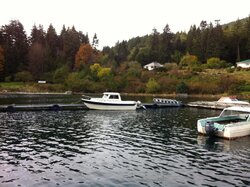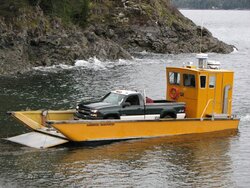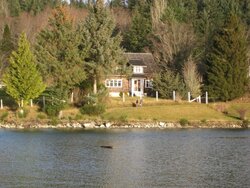So, hubby and I might have the opportunity to reno my great-grandparents house on the island (off-grid) and do it up for a vacation rental. It was built in 1937 but no one has lived in it since 1981. The family has kept up the essentials - part of the roof and siding was redone a few years ago. Minimal to no insulation - about 2000 sq ft over two floors, plus a damp basement. It would likely only be open during the summer, although I would like to put a wood insert in the fireplace so it could be opened up for winter use by the family - I have my eye on the Enviro Boston 1700.
However, there is currently no heat or hot water system in the house. It originally had a wood furnace, presumably with ducts sized for convection (no electricity for a blower).
Usual hot water for off-grid is propane (either tank or on-demand). We will have to have propane for cooking and likely a dryer (for bedding). However, getting propane to the island is a hassle and I can't woman-handle 100 lb propane tanks by myself. I would like to minimize that if possible. We do have some electricity (currently from a generator but we are looking into renewables).
Alternate heat would definitely be nice. The house is right on the water and it can get chilly at night, even in the summer. I am wary of lighting woodstoves in the summer - cedar shake roofs and dry weather and no fire department just seem like a really bad idea. By the end of September (prime fishing season), heat would probably really be needed.
I have no idea what it would cost, but would a combo pellet boiler/solar hot water (with water-to-air heat exchange in the furnace plenum) give some shoulder-season heat and DHW?
Any other ideas?
Here are our usual forms of transport:


However, there is currently no heat or hot water system in the house. It originally had a wood furnace, presumably with ducts sized for convection (no electricity for a blower).
Usual hot water for off-grid is propane (either tank or on-demand). We will have to have propane for cooking and likely a dryer (for bedding). However, getting propane to the island is a hassle and I can't woman-handle 100 lb propane tanks by myself. I would like to minimize that if possible. We do have some electricity (currently from a generator but we are looking into renewables).
Alternate heat would definitely be nice. The house is right on the water and it can get chilly at night, even in the summer. I am wary of lighting woodstoves in the summer - cedar shake roofs and dry weather and no fire department just seem like a really bad idea. By the end of September (prime fishing season), heat would probably really be needed.
I have no idea what it would cost, but would a combo pellet boiler/solar hot water (with water-to-air heat exchange in the furnace plenum) give some shoulder-season heat and DHW?
Any other ideas?
Here are our usual forms of transport:




 . I will try there too.
. I will try there too.

